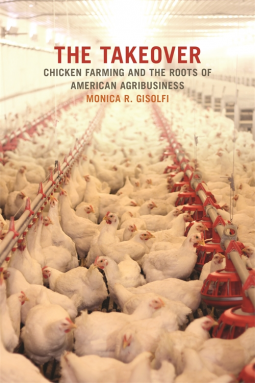
The Takeover
Chicken Farming and the Roots of American Agribusiness
by Monica R. Gisolfi
This title was previously available on NetGalley and is now archived.
Send NetGalley books directly to your Kindle or Kindle app
1
To read on a Kindle or Kindle app, please add kindle@netgalley.com as an approved email address to receive files in your Amazon account. Click here for step-by-step instructions.
2
Also find your Kindle email address within your Amazon account, and enter it here.
Pub Date Apr 15 2017 | Archive Date May 31 2017
Description
Economists have described the upcountry Georgia poultry industry as the quintessential agribusiness. Following a trajectory from Reconstruction through the Great Depression to the present day, Monica R. Gisolfi shows how the poultry farming model of semivertical integration perfected a number of practices that had first underpinned the cotton-growing crop-lien system, ultimately transforming the poultry industry in ways that drove tens of thousands of farmers off the land and rendered those who remained dependent on large agribusiness firms.
Gisolfi argues that the inequalities inherent in the structure of modern poultry farming have led to steep human and environmental costs. Agribusiness firms—many of them descended from the cotton-era South’s furnishing merchants—brought farmers into a system of feed-conversion contracts that placed all production decisions in the hands of the poultry corporations but at least half of the capital risks on the farmers. Along the way, the federal government aided and abetted—sometimes unwittingly—the consolidation of power by poultry firms through direct and indirect subsidies and favorable policies. Drawing on USDA files, oral history, congressional records, and poultry publications, Gisolfi puts a local face on one of the twentieth century’s silent agribusiness revolutions.
A Note From the Publisher
Monica R. Gisolfi is an associate professor of history at the University of North Carolina, Wilmington. Part of the Environmental History and the American South series.
Advance Praise
“The Takeover tells us the story of a
revolutionary transformation in agriculture’s business model that drove
tens of thousands of farmers off the land and rendered others dependent
on large agribusiness firms. It is a complicated story, and Gisolfi
tells it well. She has put a human face on what, in the hands of another
writer, would essentially be a business and institutional history. The Takeover
offers poignant testimony of how independent landowners became, in
essence, sharecroppers and shows the impact of that metamorphosis on
them and their families.”
—Melissa Walker, author of Southern Farmers and Their Stories: Memory and Meaning in Oral History
“How did the modern poultry industry emerge from a region of cotton
farms? What business model can explain why aspiring farmers ended up as
powerless, as processed, and as exploited as their chickens? The Takeover
deftly examines the agricultural and social history of Upcountry
Georgia and reveals the matrix of contract growing, government subsidy,
and rural impoverishment that enriched agribusiness integrators and
freed these firms from financial and environmental risk. This is a big
story about a small place.”
—Sarah T. Phillips, author of This Land, This Nation: Conservation, Rural America, and the New Deal
Available Editions
| EDITION | Other Format |
| ISBN | 9780820349718 |
| PRICE | $24.95 (USD) |
| PAGES | 124 |
Links
Average rating from 3 members
Featured Reviews
 Reviewer 153322
Reviewer 153322
This is an economic history of the transformation of upcountry Georgia from increasingly exhaustive cotton sharecropping to large-scale chicken production in the 20th century--with some startling insights into the politics and racial strata of the region, as well as the cooking transformation of chicken as a rare delicacy available when layers were old or roosters were surplus, into the ubiquitous chicken nuggets and huge frozen skinless chicken breasts widely available now. New Deal payments to reduce cotton production allowed white landowners to get into chicken raising while staying on the land as rural "farmers," and USDA research about chicken breeding and disease control and WWII government purchasing of eggs and standardization inspections created the structure for 1950s absorption into a vertically integrated supply chain. With a few huge businesses--Jewell, Tyson, Perdue, Pilgrim's Pride--at the top, suppliers found themselves in the same restrictive contracts as cotton sharecropping as these magnates outsourced all the risk of failure, investment in equipment and specific demands for feed use to the "farmers," who found themselves locked into monoculture, producing astounding amounts of waste and pollution (chicken shit, dead chickens, burned feathers, noise, etc.), heavily in debt and forced to take off-farm jobs (often in public service, like school bus drivers, or on the many southern military bases). Gisolfi is clear about how this process, supported by USDA research and agents, effectively blocked African-American farmers and favored huge producers, while the companies shifted the narrative from independent farmers to farmers as contractors who participated in the system as a "part-time" additional income to explain the small returns and manipulative oversight.









